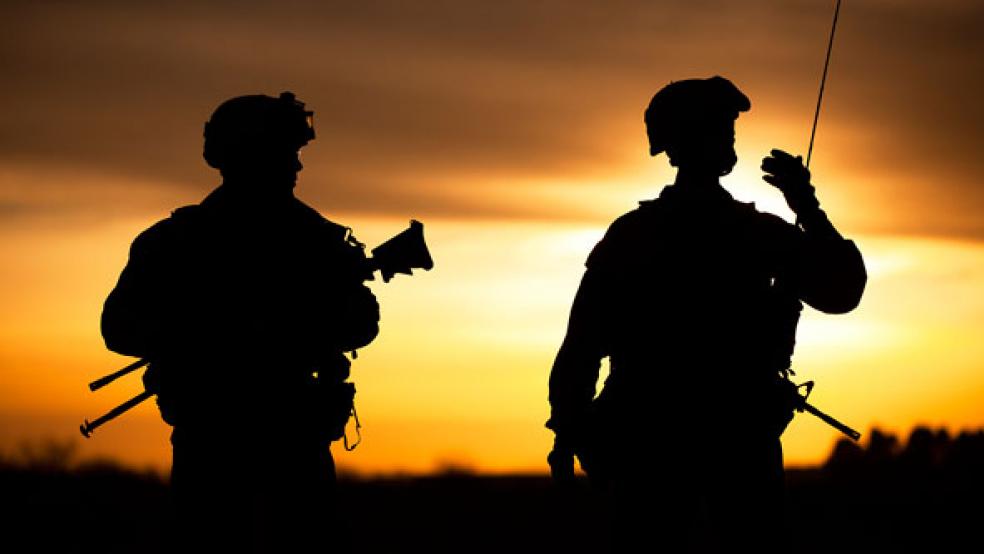
Peter Lavoy, the Pentagon’s top policy official on Afghanistan, told reporters last week that the so-called "zero option" - the complete withdrawal of all U.S. troops from Afghanistan by the end of 2014 - was not a viable option for President Obama.
Lavoy said a six month review of the security situation in Afghanistan determined that the only way to hold onto any of the hard fought gains made there would require the long-term U.S. support of troops and financing. While he did not make a specific recommendation for the number of troops that would be needed, he said that the complete withdrawal of all U.S. troops was unrealistic.
"In none of these cases have we developed an option that is zero," Lavoy said. "We envision that it will take a period of time before [Afghan security forces] can adequately fully have sovereign ownership of all those skill sets, including well beyond the 2014 date."
The Pentagon’s assertion could easily be seen as DOD protecting its turf: in an age of austerity, Afghanistan gives the military a reason to keep on spending. Lavoy is also sending a message to President Obama, who is reportedly considering withdrawing all American troops at the end of next year as his relationship with Afghan President Harmid Karzai continues to deteriorate.
But in Washington, the concept of complete withdrawal is gaining steam in some defense policy circles. The United States has already spent $667 billion in Afghanistan, according to the National Priorities Project’s Cost of War project. Nearly 2,250 soldiers have lost their lives there, and an additional 18,886 were wounded.
Withdrawing all U.S. troops at the end of 2014 would put American soldiers out of harms way. According to an estimate tabulated by The Fiscal Times, it would save at least $111 billion.
“Honestly, one of the biggest benefits of the zero would be financial,” Michael Kugelman, senior program associate for South and Southeast Asia at the Woodrow Wilson International Center for Scholars told The Fiscal Times. "Given the problem this country’s economy continues to face, the money saved by getting out is a real benefit."
$111 BILLION SAVED
To calculate the possible savings of the zero option, we reviewed DOD spending requests, USAID plans, Congressional Budget Office studies and GAO reports. We then broke these into two categories - money needed for Afghan stabilization, and money needed for DOD operation.
According to the GAO, the U.S. government, through various departments including USAID, DOD and State, is responsible for providing $32.4 billion to the Afghan government. This minimum expenditure is to be used to support Afghanistan’s fledgling democracy, support its troops, and build infrastructure. Depending on circumstances, more money might be needed.
In addition, DOD has already asked for $79.4 billion to conduct operations after the vast majority of U.S. troops have left the country. A yet-to-be-determined financial commitment would also be needed from DOD in 2015 and beyond. http://comptroller.defense.gov/defbudget/fy2014/FY2014_Budget_Request_Overview_Book_Amended.pdf
This means, that at a minimum, the United States would save $112 billion if the zero option were taken. This is 16 percent of what the United States has already spent there.
At the same time, eliminating this funding would guarantee that it is not being misspent. The Pentagon’s inability to track money being spent in Afghanistan, as well as the tendency for U.S. money to end up in the hands of the enemy has been a problem from the outset. Getting rid of this funding eliminates the potential for waste, fraud and abuse.
NO TACTICAL DISADVANTAGE
Lavoy and others who advocate for a continuing U.S. presence in Afghanistan maintain that the country would once again become a safe haven for terrorists if abandoned. According to Jacob Stokes, a research fellow at the Center for New American Security, this isn’t the case.
“It’s not ideal, but you might have to do it. You can protect your most basic interests with no troops there,” Stokes said. He added that small Special Forces teams could be used to eliminate potential terrorist targets, just as these forces have been used in Africa.
“You want to prevent it from becoming a safe haven for terrorists and becoming a great source of instability that could spill into Pakistan,” he said. “You want to target high level, organized terrorist that are looking to create threats internationally.”
According to the Wilson Center’s Kugelman, a residual U.S. force would not have the capabilities to stop these kinds of transnational threats.
“I strongly feel that any sort of residual troop presence would not prevent things from getting really bad, even worse than they are now,” he said. “The troops and equipment we’re leaving behind would not be that sizeable. The major factors at play have noting to do with the U.S. troop presence.”




